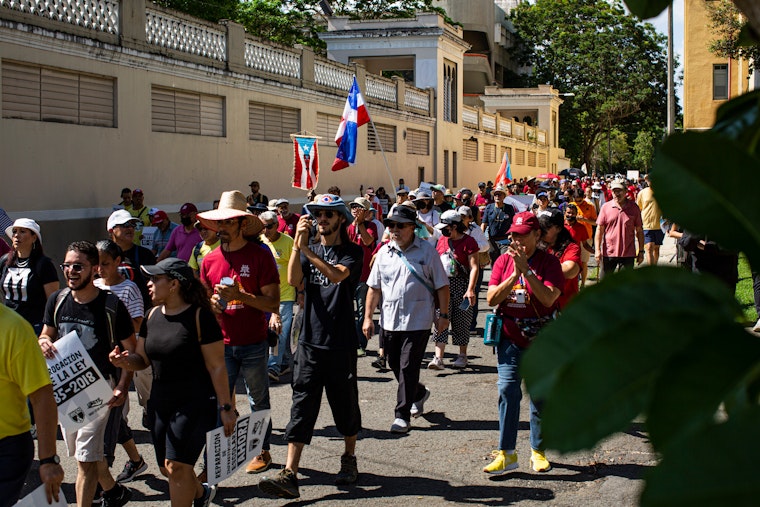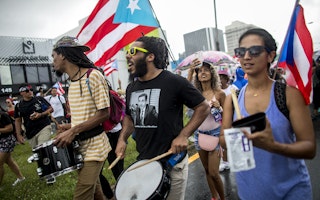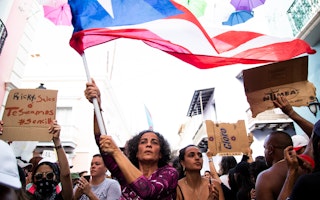Let Puerto Rico Chart Its Own Course
By Karina Claudio Betancourt

In 1898, at the end of the Spanish American War, the U.S. acquired several territories then under Spanish rule. Several years later, the U.S. Supreme Court decided the fate of these territories in a series of rulings known as the “Insular Cases,” which addressed the status of the inhabitants of these territories—and whether they should be considered U.S. citizens. In De Lima v. Bidwell, the Court termed the residents “savage tribes.” In Downes v. Bidwell, the justices branded them “alien races,” and suggested the administration of these “alien races” might be “impossible.”
Today, these cases are widely seen as racist and discriminatory against people living in unincorporated territories ruled by the U.S. They are also considered by many scholars to legitimize a colonial relationship created by Congress, one that allows the U.S. to continue its administration—and exploitation—of the territories acquired from Spain. And yet these cases have been upheld time and time again by the Supreme Court—leaving it to Congress to resolve the status of these territories.
In United States v. Vaello Madero, a 2022 case that dealt with the exclusion of a Puerto Rican who moved to the island and was denied Supplemental Security Income benefits, Justice Neil Gorsuch concurred with the majority opinion excluding Puerto Rico from the program, even as he criticized the Insular Cases as “shameful” miscarriages of justice that “have no foundation in the Constitution and rest instead on racial stereotypes,” and “deserve no place in our law.”
The Supreme Court had the opportunity to overturn the Insular Cases in the case of Fitisemanu v. United States, but in October 2022, denied certiorari. The United States Court of Appeals for the Tenth Circuit had ruled in this case that the Insular Cases should stand.
These cases, upheld by Democratic and Republican-appointed justices alike, are a brutal example of how racist and xenophobic policies perpetuate colonialism in U.S. territories to this day.
The problem extends far beyond the Insular Cases, as we were reminded this spring in another case, Financial Oversight and Management Board for Puerto Rico v. Centro de Periodismo Investigativo. The case, brought by the Center for Investigative Journalism (CPI) in Puerto Rico, sought greater transparency and accountability from the U.S.-imposed Financial Oversight and Management Board, created to manage Puerto Rico’s finances under a 2016 federal statute known as PROMESA.
The Financial Oversight Board—derided by critics in Puerto Rico as “La Junta”—has since its inception slashed in half the public University of Puerto Rico’s budget, prohibited the advancement of workers’ rights, and forced the privatization of Puerto Rico’s electrical grid, significantly decreasing the quality of service (as I write this, I do not have electricity). To date, the board has spent an average of $200 million dollars per year of Puerto Rican taxpayer money, operating in secret. In 2016, CPI requested that the board share documents, which under Puerto Rico’s constitution should be accessible to the public—especially those of us living in Puerto Rico and footing the bill. The board refused to turn over the documents, claiming sovereign immunity from CPI’s claims. CPI sued and won in two federal district courts. But when the case reached the Supreme Court, the justices—with only Justice Clarence Thomas dissenting—ruled that the board has immunity and that it can continue to operate in secrecy, impacting the lives of the millions of Puerto Ricans that live on the archipelago.
With this decision, the Supreme Court continues to perpetuate the colonialist mindset laid out in the Insular Cases—still treating the people of Puerto Rico as “alien races” unable to govern themselves. The Supreme Court should immediately overturn the racist Insular Cases, and Congress should immediately act to abolish the Financial Oversight Board, overturning PROMESA and returning the people of Puerto Rico the ability to choose our own fiscal and political future.
La Tejedora and the Center for Investigative Journalism are grantees of the Open Society Foundations
Karina Claudio Betancourt is the director of La Tejedora, an initiative that aims to connect Puerto Rican activists to social justice movements globally.

